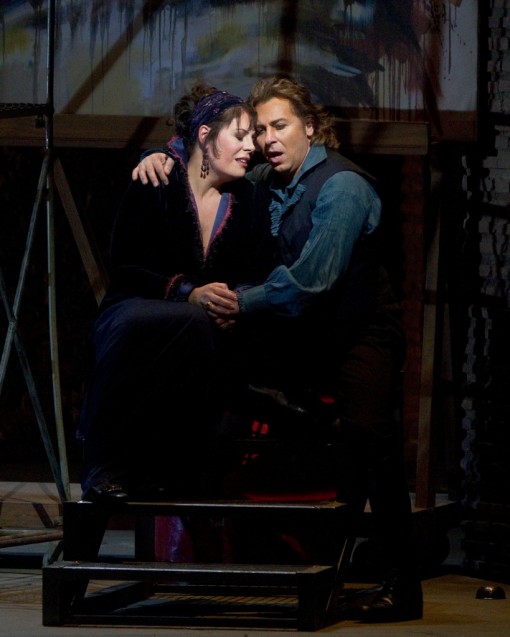Alagna’s last-minute subbing sparks a gleaming and dramatic “Tosca” at the Met

Roberto Alagna and Sondra Radvanovsky in the Metropolitan Opera's production of "Tosca," which opened Monday night. Photo: Marty Sohl
When general manager Peter Gelb announced, to some applause, that tenor Roberto Alagna would replace an ailing Marcelo Alvarez as Cavaradossi in the Metropolitan Opera’s performance of Tosca last night, it is doubtful that many in the audience worried that Alagna may not have had sufficient time to learn the blocking of Luc Bondy’s production. Given that the production aroused a now famous display of audience hostility when introduced on opening night of last season, the consensus might well be that the less it looks like it did then, the better.
But, whether one likes it or not, the Bondy production is now firmly established at the Met, and Tosca being Tosca, one can expect to encounter it with some frequency. Moreover, the production, which struck some of us as merely uninspired rather than execrable, may be winning begrudging acceptance by the audience, in part because of some welcome tweaking, such as having Baron Scarpia at the end of Act 1 merely stroke and stare at a statue of the Blessed Mother rather than performing some obscene act with it. Richard Peduzzi’s sets do remain dark and drab, more so than usual since two of the large wall maps that enhance what purports to be a room in the Farnese Palace turned up missing this time.
But as Alagna’s presumably largely impromptu acting would seem to demonstrate—he had only been asked to take over the role at lunchtime yesterday—there are no tricks to the staging that make it inhospitable to a traditionally acted Tosca. Alagna’s good-natured Cavaradossi seemed to especially enjoy having extensive physical contact with the Tosca of Sondra Radvanovsky during the Act 1 flirtations. Vocally too Alagna was in fine fettle, singing with his characteristically exemplary diction and ardent tone. His cry of Vittoria! did not elicit the most ringing high note imaginable, but both of the arias went very well, E lucevan le stelle in particular being distinguished by nicely-tapered phrases and a significant but not excessive degree of emotionalism.
Alagna’s performance, which was his first at the Met of a role he has often sung elsewhere, stole some of the thunder from Radvanovsky’s first Met Tosca, which initially looked as if it might be the most notable aspect of the performance, the opera’s first outing of the season. One knew from her success in an impressive array of Verdi roles that she has the vocal goods for Tosca, and indeed her strong, reliable voice took hold of Puccini’s melodies securely, high notes and all. The highpoint of her performance, as perhaps it should be for any Tosca, was her heartfelt, expressively phrased and generously sung account of Vissi d’arte, which won a prolonged ovation. Nevertheless, an ideal Met Tosca will have a prettier voice than hers, which can often sound edgy. Plush and velvety, Radvanovsky’s voice is not.
Still, hers was an involving performance, not least in Tosca’s scenes with the Scarpia of Falk Struckmann. This was the distinguished German bass-baritone’s first Italian role at the Met, yet his characterization of Rome’s police chief emerged as one of the most malevolent since Tito Gobbi and in sheer vocal terms it is far more commanding. Don’t expect the elegance that some regard as an integral part of the role, but this Scarpia projects a keen intelligence that makes him all the more chilling. Struckmann has the ability to give every phrase he chooses an evil twist and he uses the gift tellingly.
Marco Armiliato presides alertly over a smoothly running performance that misses little of importance in Puccini’s score.
Tosca runs through Jan. 29, then returns on Mar. 25 for more performances through April 16. metoperafamily.org.
Posted Jan 17, 2011 at 1:56 pm by Matthew Gurewitsch
Thanks from one who was not there for a vivid report. Just curious: did GL see last season’s final performance with the dream team of Patricia Racette, Jonas Kaufmann, and Bryn Terfel? I ask because Terfel’s Scarpia was simply terrifying, despite episodes of truly silken song (elegance indeed). Nice to think we live in an age of giants, and we do.